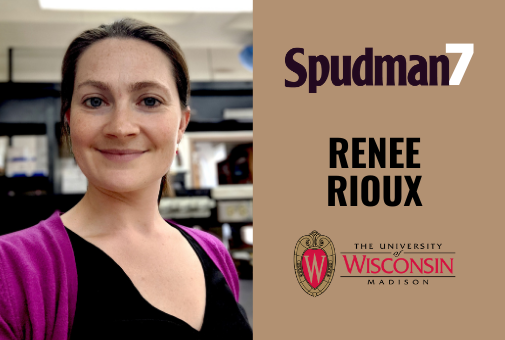
Renee Rioux settling in as Wisconsin’s seed certification director
Renee Rioux was tapped to be the administrative director of the Wisconsin Seed Potato Certification Program in August 2019. Since then, she’s been developing research and teams and getting to know the seed potato growers in the state, which hasn’t been easy due to COVID-19. We checked in with Rioux to see how things are going.
1: What is your background?
I was born in Bar Harbor, Maine, and lived there until around age 9, when my family moved inland to a small town near Bangor. I have bachelor’s and master’s degrees in biology and plant pathology, respectively, from the University of Maine-Orono and a Ph.D. in plant pathology from the University of Wisconsin-Madison. I worked at NewLeaf Symbiotics as a crop protection manager from 2014-17 and then as a product development manager at Bayer Crop Science (2017-19).
2: You had familiarity with UW. What drew you back?
The very first time I visited campus was in August 2009, when I was thinking about coming to Madison for graduate school. I remember meeting with some professors and then sitting at the terrace and drinking a beer while reading papers. It was absolutely gorgeous and I was hooked — so much so that this was the only university I applied to for my Ph.D.
3: How’s the job going so far?
Early on, I was trying to visit as many Wisconsin seed grower farms as possible to learn about their operations and spend time at our state farm as well. This was made a lot more difficult by COVID, and I am very much missing that face-to-face interaction. At the same time, I’ve taken advantage of the great opportunity to build out my research team and get started on a few key projects.
4: Any exciting prospects to report?
Our research right now is mostly focused on blackleg and soft rot pathogens, particularly better understanding how they interact with each other and the environment. We are also establishing exciting research with potentially beneficial microbes isolated from field-grown potato plants and looking at what happens when we apply these microbes to early generation planting stock and then transplant them to the greenhouse or expose them to pathogens. Basically, probiotics for plants. In the long run, we’re hoping these projects can help us improve early generation seed production and better manage pathogens before they become established in seed.
5: What else is on the horizon?
There are two big areas we’re just starting to scratch the surface of that I see as opportunities. The first is detection and diagnostics. These are important focus areas of the Vision 2025 project within seed certification nationally and are of interest to us. With advances in genetic sequencing and diagnostic tools, there are a lot of possibilities to process more samples in less time, with greater sensitivity, and increased efficiency in terms of the number of pathogens we can look for within a single test.
6: And the other?
The second focus area I see is big data. We collect an incredible amount of data in seed certification. This information goes into the Plant Health Certificate and is used to make certification decisions, but we don’t use it for much else. With the years of data the program has collected, there are many possible uses and questions this information could be used to answer.
7: What is your favorite way to eat potatoes?
All of them! I love potato chips — especially thick, crunchy ones — but I am also a huge fan of fries. At the same time, baked potatoes are amazing because there are so many fun ways you can dress them up, and I am a big fan of breakfast potatoes!







